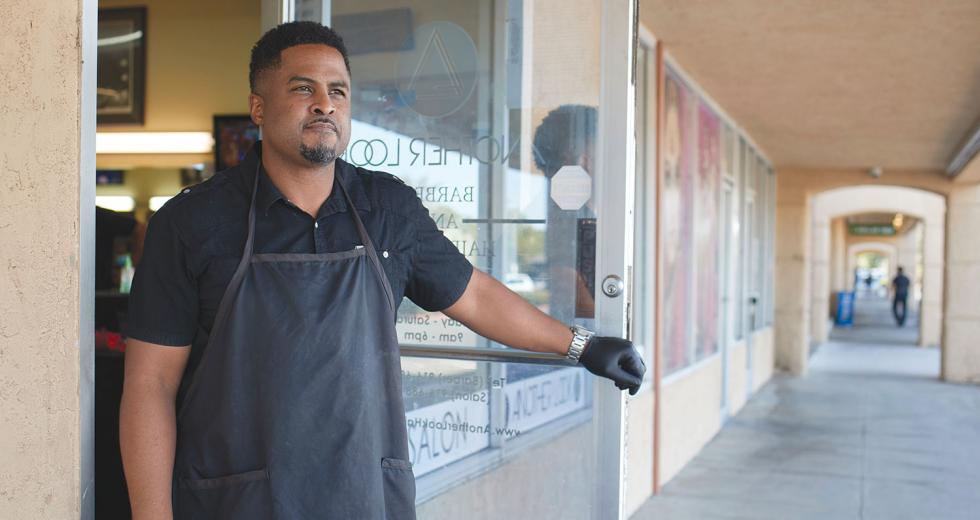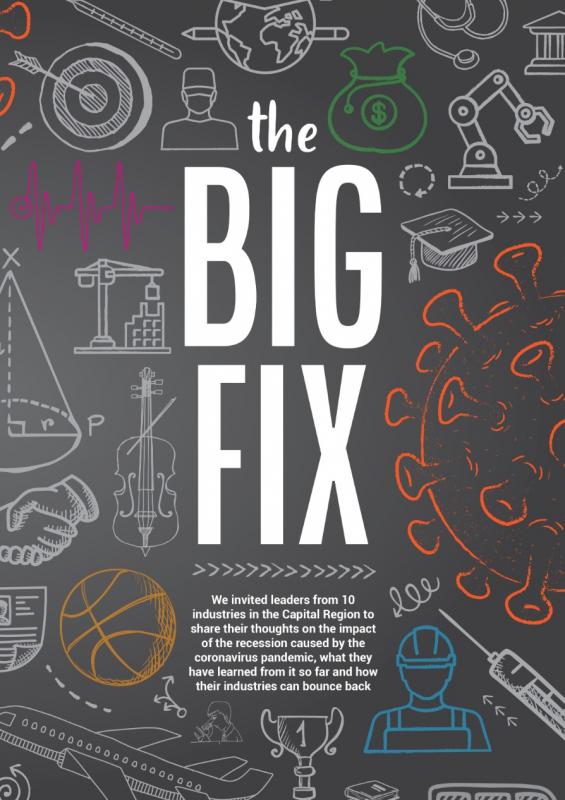It was May 31, and protests rang out across the United States demanding justice after the murder of George Floyd by a white police officer in Minneapolis, as three other officers stood by and did nothing. The country, already reeling from COVID-19, had reached a boiling point. That night, Rob Brown was in his barbershop on Valley Hi Drive in south Sacramento waiting. He didn’t board up the shop. He didn’t put any Black Lives Matter signs in his windows to inform outsiders of his allegiance. He locked up the printer and computers, and he stood guard.
“Black folks know me,” he says weeks later. “I knew that if they were from Sacramento, they wouldn’t harm my stuff. But what made me paranoid was hearing that people were coming from out of town, pulling up in trucks and vans. Not the marchers. Outsiders in the crowd.”
Another Look Beauty & Barber Salon had been forced to shut down since March 16 during the coronavirus pandemic, marked as a nonessential business. Brown and his wife, Tracy Brown, who runs the hair salon in the adjacent suite, managed to get by the first month and a half. But relief didn’t look like it was coming for months, and he was starting to panic.
“It was disrespectful to put us on the same level as gyms,” says Brown, who went through 1,500 hours of training at barber college, which includes lessons on health and safety. “A dentist can stay open and put his hands in my mouth, but I can’t stand behind somebody and cut their hair.”
The dire reality of Black-owned businesses in America has been exposed in recent months. As the Washington Post reported, the Black-white economic divide has barely changed since 1968. But the pandemic put the racial disparity on full display. Not only have Black Americans suffered more from COVID-19 infections and deaths, but evidence from the Stanford Institute for Economic Policy Research shows that Black-owned businesses were hit the hardest due to the shutdown, experiencing a 41 percent loss of business owners this spring. Not only that, but Black business owners barely got a whiff of the government loans to help weather the economic storm. Only about 12 percent of Black and Latinx small business owners received the federal funds they requested, and almost two-thirds received no assistance, the findings revealed.
The City of Sacramento announced a $1 million pool for emergency relief for small businesses. Of the 101 loans granted, only a handful went to Black-owned small businesses. Brown, who also runs the Mixed Institute of Cosmetology & Barber School, wasn’t one of them. And on May 31, just days after reopening and as protests against police brutality and systemic racism took over the streets, Brown found himself caught between supporting the cause and protecting his shop. In the end, nobody broke into his barbershop, and all the protests he saw were peaceful. But he admits that line between fighting for justice and staying on the right side of the law is a tricky one to walk. One felony, he says, can change a person’s life forever. But this tightrope act is nothing new to Black business owners trying to survive in a nation built on racism and economic injustice.
“I’m 48 years old, I’ve done my share of getting out there,” Brown says. “These young people have some fire. A young gentleman came into the shop, and he was shot in the eye and the leg with a rubber bullet. College student. The kid’s been coming to our shop forever. He said, ‘I don’t even know what to do.’ I didn’t want anybody to affect my business, but I understand people are angry.”
‘Not Good Enough’
By mid-July, facing rising COVID-19 cases, California Gov. Gavin Newsom ordered the state’s indoor businesses to shut down again. The news was devastating to Brown, who had followed protocols to the letter. His salon, he says, bought masks, gloves, air purifiers, scheduled appointments an hour apart, had no waiting in the salon and kept a 6-feet distancing policy.
“We are working to pay our bills so we can live,” Brown says. “All while making sure we keep our families and clients safe, governed by state agencies that make sure we are following rules, and we are now, once again, forced into more debt, or worse bankruptcy for sure this time.”
Rob and Tracy Brown own Another Look Beauty & Barber Salon in
south Sacramento. They didn’t qualify for a Paycheck Protection
Program loan because, technically, they don’t have employees.
(Photo by Fred Greaves)
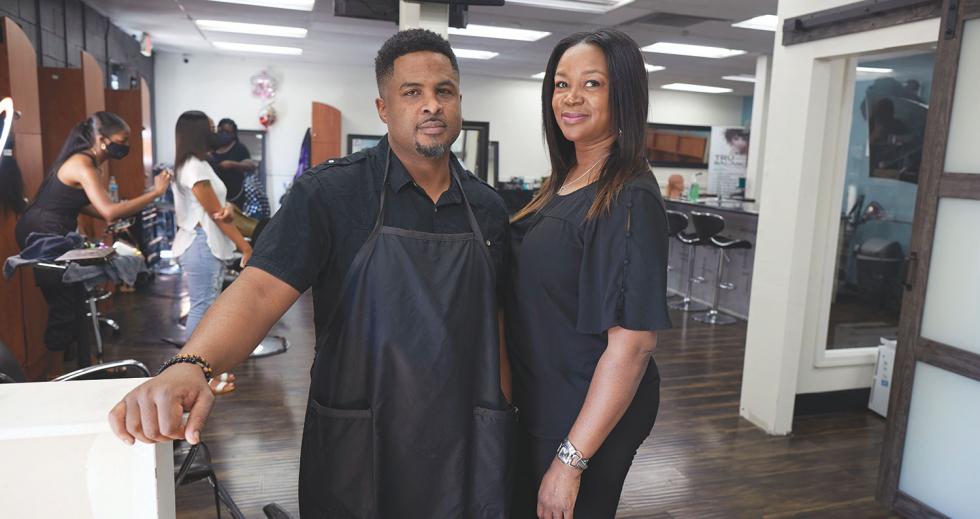
Like most booth-rental salon owners, Brown did not qualify for the Paycheck Protection Program loan because, technically, he doesn’t have employees. In June, he did get an Economic Injury Disaster Loan approved for $40,000, but, unlike the PPP loan, he will have to pay that money back. It is unfair that his business has to close again because careless people failed to heed health warnings, showing no regard for the safety of others, he says.
Later in July, Newsom announced that some personal care services might be able to reopen outdoors with county public health officer approval. Brown says the barbers at his shop might move forward with this if it’s not too hot outside. They wouldn’t want to risk cutting a client’s skin due to sweat. But he says the stylists can’t do anything outside because almost everything related to doing a Black woman’s hair requires water.
“This is just a slap in the face and disrespectful,” he says. “We spend the little income we have left to buy all this stuff to make the inside PPE ready, and now we have to spend more money on tents and electrical extension cords to go outside. This is an utter failure of our government and our regulatory agencies.”
As the pandemic ravaged the globe, Salena Pryor, a former legislative consultant, saw that a whole community of barbers and cosmetologists like Brown were getting left out. She took immediate action, writing a letter in April to Sacramento Mayor Darrell Steinberg, stating that systemic racism restricted access to financial resources for the Black community, and it needed to change immediately. (She didn’t receive a response.)
Pryor channeled her efforts into continued advocacy as president of the Sacramento-based Black Small Business Association of California, an organization she created this spring to make sure Black-owned businesses get equal pieces of the financial pie.
“We’re making sure that Black voices are being represented, influencing decision-makers so our communities can stop being left out of certain industries. … We’re going to need that purse to open to mitigate damage caused throughout the years.”
SELENA PRYOR PRESIDENT, BLACK SMALL BUSINESS ASSOCIATION OF CALIFORNIA
“We’re making sure that Black voices are being represented, influencing decision-makers so our communities can stop being left out of certain industries,” Pryor says. “People of color, historically, had to deal with redlining, Jim Crow, mass incarceration — we’re going to need that purse to open to mitigate damage caused throughout the years.”
Marchers in the streets, small business owners, journalists, artists and others have a role to play in this fight for equality, she says. Pryor fights on the legal front, whether advocating for Black business owners or working to dismantle policies that perpetuate systems of inequality. The organization strongly supports Assembly Constitutional Amendment No. 5, the bill to restore affirmative action in California and overturn Proposition 209, also known as the California Civil Rights Initiative, which passed in 1996.
“These policies keep the Black community out of opportunities that we deserve,” Pryor says. “The powers that be and those with a sense of entitlement will continue to overlook us and pretend we don’t exist. No more of this farce of a colorblind mentality or the notion of one being unqualified or ‘If we pick one, that’s good enough.’ No, it’s not good enough.”
Greater Emphasis on Racial Health
Rob Archie was one of the lucky ones. The co-owner of Urban Roots Brewing & Smokehouse and Pangaea Bier Cafe was one of the few Black business owners to receive an emergency loan from the city. But money doesn’t automatically erase the racism he has experienced both in his personal and professional life.
“When people walk through the door, they should feel enough,” says Archie, who grew up in Woodland, “and that’s the problem with racism: People are made to feel not enough.”
Archie’s solution is simple: Treat people like human beings. He trains his staff to make sure every person who comes through his doors feels welcomed, like an invited guest to a house party. But when the coronavirus outbreak forced him to close, his businesses went from 3 percent takeout to 100 percent. The beer was canned, packaged and put into distribution, which shot up 800 percent, he says. His businesses have since reopened with social distancing rules in place and an even greater emphasis on what he calls racial health.
“I see racism like physical health,” Archie says. “If one day, I want to be LeBron James, I need to start training. In the same way, if I want to be racially healthy, it’s my job to learn the norms of different cultures. You have to step out of your comfort zone if you want to be racially healthy. You can always tell the person with the new shoes at the gym who ain’t been putting in no work.”
Building Healthy Communities, a 10-year, $1 billion initiative funded by The California Endowment, is focused on improving 14 of California’s communities most devastated by health inequities. In the initiative’s list of 10 factors that make for a healthy community,
No. 8 says, “Community health improvements are linked to economic development.” Kim Williams, the Sacramento hub director for BHC, says Black-owned businesses need to thrive for communities to be healthy, but transformation can’t happen without support.
“People of color have been the ones hit the most,” she says. “When you have COVID and civil unrest and all the frustrations, people are tired. We’ve been fighting and struggling and still can’t get the support. When you start magnifying everything, at some point, it starts to boil over.”
Strength in Numbers
One reason small businesses suffer is because many major cities still put big companies on a pedestal, according to Keith Taylor, a community economic development specialist at UC Davis’ Department of Human Ecology. In the past, employer subsidies would be “stickier,” he says, meaning that firms would relocate for long periods of time and employ a large labor force. “Now, they’re very mobile, with fewer and fewer staff,” he says. “So planners and policymakers need to consider if those monies are well spent on attraction and retention or growing local enterprise.”
Taylor says current policies use investment acts under the guise of empowering marginalized communities when, in reality, they merely attract corporate giants to swoop in and take over. He points, as an example, to the Sacramento Kings’ Golden 1 Center, which received a $255 million public subsidy in the deal.
“Here you have a wealthy sports team, receiving a big chunk of public dollars,” Taylor says. “And for what? Does this create numerous good jobs in-line with the costs? And what is required of the Kings? What if they decide to pit Sacramento against another city for stadium upgrades?”
Taylor believes co-ops — a business structure where the entity is owned by community members — need to be part of the economic development toolbox for meaningful impact. As an example, he points to Northern European social democracies, which invest heavily in co-ops to “offset the excesses of capitalism and bake durability and stability into economic and social policies,” he says.
“If we continue to do what we’ve done the last 40 years,” Taylor says, “we will continue the system in crisis and make it worse.”
But this line of thinking is wrong, according to Barry Broome, president and CEO of the Greater Sacramento Economic Council. He says big companies help small businesses thrive by increasing foot traffic. He adds that putting innovation hubs in disadvantaged neighborhoods not only creates jobs, but also helps reduce costs for transportation and day care for the people who live there. He uses Aggie Square — UC Davis’ planned research and tech satellite campus in Oak Park — as an example. Broome also emphasizes the need for “digital upskilling” for disadvantaged and displaced workers in Sacramento’s most impacted communities. This year, GSEC partnered with the Greater Sacramento Urban League to propose a pilot program: two 12-week tracks for 100 students in the fields of software engineering and information technology.
As for co-ops, Broome thinks they are good, but says the growth potential is limited. “The minute we talk about minority-owned enterprises, why do we go to a small-wage business?” Broome says. “Why can’t we scale? … We need to stop segmenting in our minds that a minority-owned business is somehow a permanent small business that doesn’t have a chance to turn into a global business.”
Every business, big or small, needs support. The Sacramento Black Chamber of Commerce has been around for 35 years, providing technical assistance, training and tools necessary for small businesses to be successful. “If you don’t have anyone on your side, supporting your effort, you’re not going to be that successful doing it alone,” says CEO Azizza Davis Goines. “There’s strength in numbers, and we know that the sooner we can collectively work together and provide our own sustainability, the better off it will be for the rest of the city.”
Since the pandemic began, Goines has been on conference calls with local officials, talking about the state of the business community. The updates helped her learn who was lending, how much and how chamber members could get those funds. Access to funding is a step in the right direction, she says, but the issues of racism and injustice that created the disparity for Black-owned businesses can’t be solved with a quick fix.
“Many (businesses) I’ve talked to say they’ve had (residents) calling them saying, ‘I’m sorry, what can I do?’” Goines says. “Many people say they appreciate the calls, but there’s so much pain at this time, and it’s difficult to tell somebody who has caused the problem how to fix it. The whole issue around systemic racism didn’t happen overnight.”
A Neutral Zone
As the fight for equality continues, Black residents aren’t the only ones taking action. Neil Estaris, co-owner of Sacramento’s Oblivion Comics & Coffee, has shown support for the movement, even after what happened on May 31. That night, he hid the store’s valuables, took electronics home and removed any cash from the shop as a precaution. Around 11:15 p.m., Estaris received a notification on his phone: The store alarm had been triggered. He went to check it out and found Oblivion had been broken into.
“We felt invulnerable,” he admits almost a month later. “We posted Black Lives Matter material on the windows and didn’t think we would get hit.”
When Estaris and co-owner Laura Benson set out to start a business, they wanted to create a welcoming space for everyone. It was a struggle putting together a business plan, meeting real estate agents and loan officers. But in 2016, they won the Downtown Partnership’s Calling All Dreamers contest and received $100,000 in startup services, $10,000 in starting capital and a SCORE mentor. The shop is named after DC Comics universe’s Oblivion Bar, a neutral zone where heroes and villains can talk and drink peacefully.
Sacramento artist Seraiah Nichole works on a mural at Oblivion
Comics & Coffee. More than 20 Black artists responded to a
request by owner Neil Estaris to transform the boards that were
put up to protect his business. (Photo by Ashley Hayes-Stone)
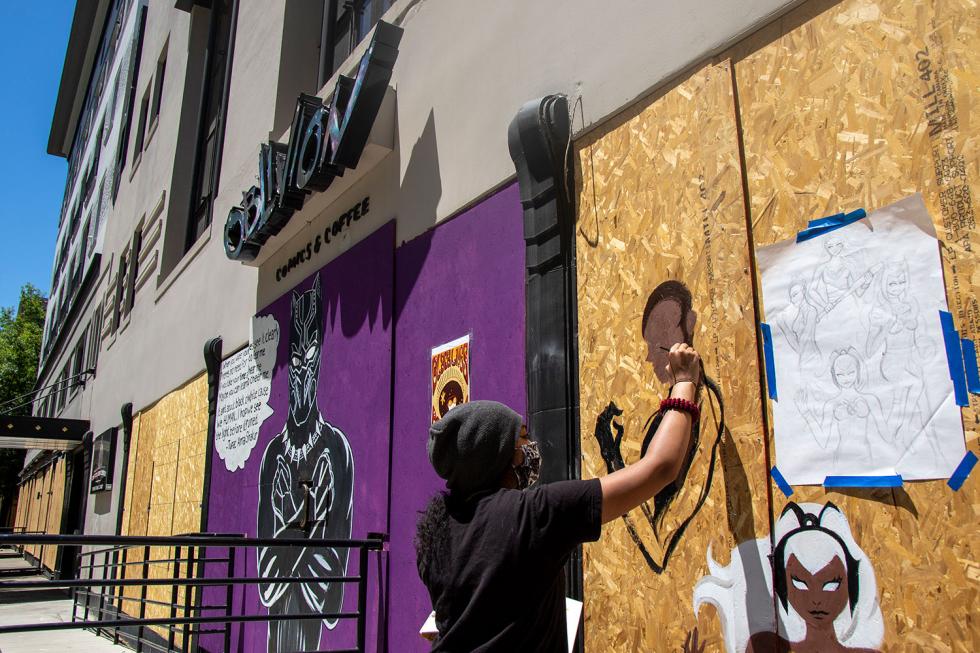
After the break-in, community members asked how they could help, so the co-owners set up a GoFundMe account with a goal of $5,000. They received about $7,000 from 128 donors in 21 days. Estaris says the business stands with the protesters against racism and injustice. “We’re backing the movement fully,” he says. “Businesses aren’t supposed to voice their opinions as much as we have, but we feel really strongly about this.”
He posted a call for submissions for Black artists to create artwork on the wood panels used to board up the shop. More than 20 artists responded, and soon after, the boards transformed into a vibrant collage including Black Lives Matter iconography, raised fists, a self-portrait and an image of Black Panther reciting lyrics from Tupac Shakur.
When you wipe your eyes, see it clearly
There’s no need for you to fear me
If you take your time and hear me
Maybe you can learn to cheer me
It ain’t about Black or white, ’cause we human
I hope we see the light before it’s ruined
–
Stay up to date on the effects of the coronavirus on people and business in the Capital Region: Subscribe to the Comstock’s newsletter today.
Recommended For You
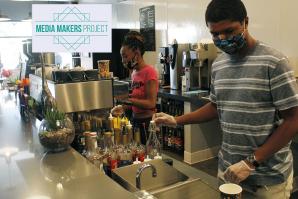
Savvy Business Moves
Black-owned businesses and their customers rally to stay afloat amid the pandemic and protests calling for social change
Many people have been actively promoting the patronization of Black-owned businesses as an act of social justice capitalism.
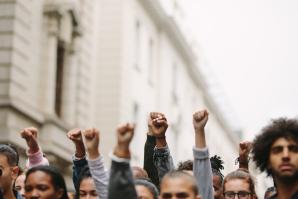
Up to the Task
Nehemiah Emerging Leaders Program founder Scott Syphax on how emerging leaders can help achieve social justice
In June, the Sacramento-based Nehemiah Emerging Leaders Program addressed the recent deaths of George Floyd, Ahmaud Arbery, Breonna Taylor, Stephon Clark and other Black people at the hands of the police in an open letter to the greater Sacramento community.

How Leaders Can Build True Inclusion
Adrienne S. Lawson, of UC Davis Health, talks about how leaders can promote workplace inclusion and justice
As the U.S. grapples with the COVID-19 pandemic, factors such as socioeconomic status, education, neighborhood and employment play a pivotal role in the fight against systemic racism and social injustice.
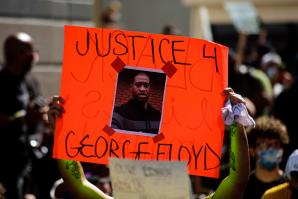
For a Black Social Media Manager in the George Floyd Age, Each Click Holds Trauma
Many Americans describe watching the videos as a wake-up call to persistent racial injustice. For Black Americans, it touches a deeper nerve.



